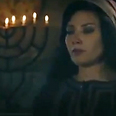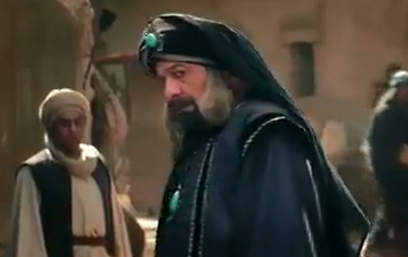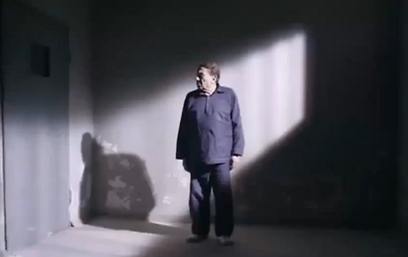
Ramadan TV shows focus on Jews, Syria, social rift in Arab world
As Muslims begin month-long fast, traditional drama shows begin airing as well. On this year's menu: Jews of Medina, present day Syria, collapse of Arab world values, plight of Syrian refugees
These shows fight attempt to gather entire nations in front of their respective TVs and ease their minds on tomorrows fast or the turmoil in Egypt. This year's productions focus on Jews of both the past and the present, the plight of a middle-class Syrian family displaced because of the Syrian conflict.
The twist: Hezbollah's channel was one of the only not to focus on Israel or Jews, aiming their scorn at Turkey instead.
Related stories:
- Mini Assad dolls star in puppet satire of Syrian conflict
- Hezbollah TV presents: Ramadan special
- Egyptian candid camera show launches 'war' on Israel
One such show which has been receiving its fare share of media attention in the Arab world is "Khaybar," a historical drama recreating the famous battle of Khaybar, dating back to the first days of Islam. The battle was fought out between the Prophet Muhammad and his loyalists, and local Jewish tribes living the Khaybar region in northwestern part of the Saudi Arabian peninsula.
The Jews were eventually defeated and expelled from the area, and to this day the battle is a source of inspiration for Muslim warriors, specifically those fighting against Israel. "Khaybar, Khaybar. Oh Jews, Muhammad's army will return," is the famous slogan from this ancient battle and it can still be heard today.
The show, which was shot in the dunes between Cairo and Alexandria in Egypt, is an international Arab coproduction: the director is Jordanian, the script Egyptian and the production Qatari; and actors arrived from Egypt, Jordan, Iraq, Syria and Qatar.
Even before the Ramadan and its screening, Al-Jazeera informed its viewers that the show "sheds new light on the battle with the Jews, on their hate for Islamic preaching, on their crafty schemes, their preference of the residents of Medina over the Prophet and even their personal aggression towards Muhammad himself."
According to media reports, the show focuses on the social, religious and political lives of the Jews of the time, as well as on their expulsion from the peninsula, their alliances with neighboring tribes and their internal power struggles.

'Khaybar, Khaybar. Oh Jews, Muhammad's army will return'
It "presents the Jew's characteristics and the manner their aggression and animosity towards others developed," the Al-Jazeera report said. Additional media reports also echoed claims that Zionists in the US attempted to lobby US President Barack Obama to try to block the show's broadcast, claiming it promotes anti-Semitism in the Arab world.
The scriptwriter, Yusri Jundi, has become a hot commodity on the Arab interview circuit. "The series shows how the Jews are Jews and that their nature endures despite the fact that hundreds of years have past, they still spread corruption wherever they live," he told Al-Jazeera.
He claimed that the show portrayed Muhammad as founding a state with complete civil equality, including for the Jews, but the latter "failed to adapt to the new system," leading to war.
Once upon a time in Damascus
An additional show portraying Jewish-Muslim relations is "Hadat' pi Dimashq" (Once upon a time in Damascus). The Syrian actress Sulaf Fawakherji portrays Vidiad – a young Jewish girl from Damascus barred from marrying her Muslim lover because of social norms and forced to wed Fouad the Zionist, a relative, in his stead. The fire in her heart still burns strong for her Muslim lover, pitting her in a struggle between loyalty to her self and loyalty to her religion, family and nation, as the al-Sharq al-Awsat newspaper described it.
The show moves between two time periods. The first is Damascus of 1947, portraying the social and political climate there at the time, as well as the changes taking place in response to the Palestinian issue. The show then moves onto examine the fate of these characters in 2001.
Fouad, Vidiad's husband, is a Jew living in Damascus who is in direct contact with the Jewish Agency and is active in assisting Syria's Jews immigrating to Israel. This leads to a rift between him and his wife who refuses to give up her Syrian identity.

More Syrian than Jewish
Regarding her character, Fawakherji said: "Vidiad is a Jewish woman opposing Jewish immigration to Palestine and the foundation of the State of Israel. She is loyal to her Syrian identity and later she refuses to travel to Palestinian, refusing to live in a house which is not hers on a land which is not hers."
Fortune teller
Those preferring current events and bigger stars are invited to watch Al Araf (the name of the main character which means fortune teller). The show stars none other than Adel Imam, the biggest of Egyptian movie stars, who only last year returned to the small screen after a 30-year hiatus.
Imam was one of the first victims of the rise of Islamist politics in the form of the Muslim Brotherhood in Egypt, as only a few months ago he was convicted of offending Islam and was sentenced to three months imprisonment. Last year, Imam played in the comedy The Naji Attalah Crew, which frequently focused on the relations between Israel, Egypt and the Palestinians.

Al Araf
His current show portrays an escaped inmate who inadvertently becomes a nominee for the Egyptian presidency. The show touches on the deep social crisis Muslim society is currently facing as well as the collapse of its traditional morals and values.
An additional topical show is Naud Beud Kalil (Be back soon), a Syrian produced drama to be aired in Lebanese channels, staring famous Syrian actor and director Duraid Laham.
The show portrays the plights of displaced Syrians through the story of the Najib family. The family's father decided to leave their Damascus apartment to visit Lebanon, but after realizing that the new life he has organized for his children is not what he though it would be, his health begins to deteriorate.
The Hezbollah-affiliated Al-Manar network has chosen to pass on its flagship series during the last two years – "A Ralibun" (The Victors) which portrays Hezbollah's struggles against Israel since its inception – in favor of a historical show titled "Tahim Haruvim" (Life of the Swords), which portrays the battles local Lebanese and Syrians have faced in the region, specifically that against the Ottoman Turks, and then the French colonial mandate and then the British one.
It seems this year, Hezbollah is giving Israel a break in favor of a jab at Erdogan.
Neemdor Semel also contributed to this story










